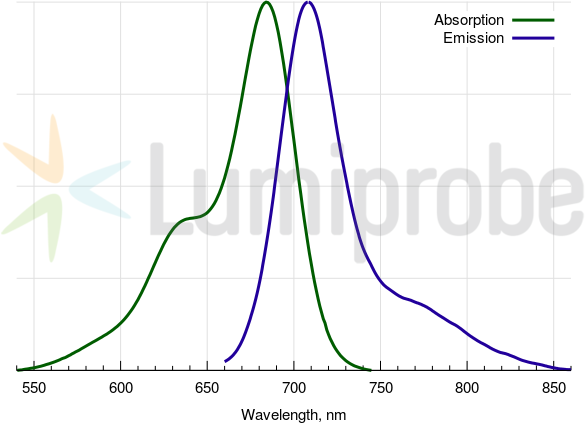Cyanine5.5 azide
| Cat. # | Quantity | Price | Lead time | Buy this product |
|---|---|---|---|---|
| 14030 | 100 uL, 10 mM/DMSO |
–
|
in stock | |
| 34030 | 500 uL, 10 mM/DMSO |
$199
|
in stock | |
| 44030 | 1 mL, 10 mM/DMSO |
$495
|
in stock | |
| A4030 | 1 mg |
–
|
in stock | |
| B4030 | 5 mg |
$199
|
in stock | |
| C4030 | 10 mg |
$297
|
in stock | |
| D4030 | 25 mg |
$495
|
in stock | |
| E4030 | 50 mg |
$895
|
in stock | |
| F4030 | 100 mg |
$1490
|
in stock |

This Cyanine5.5 labeling reagent is a dye azide for click chemistry, available as 10 mM solution in DMSO, or in solid form. The dye possesses far red / near infrared emission, which allows to use it for NIR live organism imaging. Cyanine5.5 can replace Cy5.5® and DyLight 680.
Absorbance and emission spectra of Cyanine5.5

Customers also purchased with this product
General properties
| Appearance: | dark violet solid/ dark blue solution |
| Molecular weight: | 701.34 |
| Molecular formula: | C43H49ClN6O |
| Solubility: | soluble in organic solvents (DMSO, DMF, dichloromethane), practically insoluble in water (1.6 uM, 1.2 mg/L) |
| Quality control: | NMR 1H, HPLC-MS (95%) |
| Storage conditions: | Storage: 24 months after receival at -20°C in the dark. Transportation: at room temperature for up to 3 weeks. Avoid prolonged exposure to light. Desiccate. |
| MSDS: | Download |
| Product specifications |
Spectral properties
| Excitation/absorption maximum, nm: | 684 |
| ε, L⋅mol−1⋅cm−1: | 198000 |
| Emission maximum, nm: | 710 |
| Fluorescence quantum yield: | 0.2 |
| CF260: | 0.07 |
| CF280: | 0.03 |
Product citations
- Kodaka, M.; Kikuchi, A.; Kawahira, K.; Kamada, H.; Katsuta, R.; Ishigami, K.; Suzuki, T.; Yamamoto, Y.; Inoue, J. Identification of a novel target of sulforaphane: Sulforaphane binds to acyl-protein thioesterase 2 (APT2) and attenuates its palmitoylation. Biochemical and biophysical research communications, 2024, 726, 150244. doi: 10.1016/j.bbrc.2024.150244
- Kang, J.‐Y.; Mun, D.; Chun, Y.; Park, D.‐S.; Kim, H.; Yun, N.; Joung, B. Engineered small extracellular vesicle‑mediated NOX4 siRNA delivery for targeted therapy of cardiac hypertrophy. Journal of Extracellular Vesicles, 2023, 12(10), 12371. doi: 10.1002/jev2.12371
- Bashore, C.; Prakash, S.; Johnson, M. C.; Conrad, R. J.; Kekessie, I. A.; Scales, S. J.; Ishisoko, N.; Kleinheinz, T.; Liu, P. S.; Popovych, N.; Wecksler, A. T.; Zhou, L.; Tam, C.; Zilberleyb, I.; Srinivasan, R.; Blake, R. A.; Song, A.; Staben, S. T.; Zhang, Y.; Arnott, D.; Fairbrother, W. J.; Foster, S. A.; Wertz, I. E.; Ciferri, C.; Dueber, E. C. Targeted Degradation via Direct 26S Proteasome Recruitment. Nature Chemical Biology, 2023, 19(1), 55–63. doi: 10.1038/s41589-022-01218-w
- de Paiva, I. M.; Vakili, M. R.; Soleimani, A. H.; Tabatabaei Dakhili, S. A.; Munira, S.; Paladino, M.; Martin, G.; Jirik, F. R.; Hall, D. G.; Weinfeld, M.; Lavasanifar, A. Biodistribution and Activity of EGFR Targeted Polymeric Micelles Delivering a New Inhibitor of DNA Repair to Orthotopic Colorectal Cancer Xenografts with Metastasis. Mol. Pharmaceutics, 2022, 19(6), 1825–1838. doi: 10.1021/acs.molpharmaceut.1c00918
Cy® is a trademark of Cytiva.
This Product is offered and sold for research purposes only. It has not been tested for safety and efficacy in food, drug, medical device, cosmetic, commercial or any other use. Supply does not express or imply authorization to use for any other purpose, including, without limitation, in vitro diagnostic purposes, in the manufacture of food or pharmaceutical products, in medical devices or in cosmetic products.
Short link - lumiprobe.com/sh/p/n
The count of items is incorrect.

























 $
$ 
